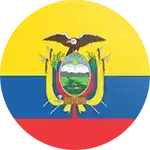Ecuador
-- Republic of Ecuador --
Ecuador officially the Republic of Ecuador is a representative democratic republic in South America, bordered by Colombia on the north, Peru on the east and south, and the Pacific Ocean to the west.
The main spoken language in Ecuador is Spanish (94% of the population). Languages of official use in native communities include Quichua,Shuar, and eleven other languages. Ecuador has a land area of 283,520 km2. Its capital city is Quito, which was declared a World Heritage Site by UNESCO in the 1970s for having the best preserved and least altered historic center in Latin America.
Ecuador is home to a great variety of species, many of them endemic, such as those of the Galápagos Islands. This species diversity makes Ecuador one of the seventeen megadiverse countries in the world, it is considered the most biodiversity country in the world per unit area. The new constitution of 2008 is the first in the world to recognize legally enforceable Rights of Nature, or ecosystem rights.
Ecuador is a presidential republic. It became independent in 1830 after having been part of the Spanish colonial empire and, for a much shorter time, of the republic of Gran Colombia.
-- Economy --
Ecuador's economy is the eighth largest in Latin America and experienced an average growth of 4.6% between 2000 and 2006. The extreme poverty rate has declined significantly between 1999 and 2010. In 2001 it was estimated at 40% of the population, while by 2011 the figure dropped to 17.4% of the total population. This is explained to an extent by emigration and economic stability achieved after adopting the US dollar as official means of transaction. However, starting in 2008 with the bad economic performance of the nations where most Ecuadorian emigrants work, the reduction of poverty has been realized through social spending mainly in education and health.
-- Politics --
The current state of Ecuador consists of five state functions: the Executive Function, the Legislative Function, the Judicial Function, the Electoral Function and the Transparency and Social Control. Ecuador is governed by a democratically elected President, for a four-year term. The current president of Ecuador, Rafael Correa, exercises his power from the presidential Palacio de Carondelet in Quito. The current constitution was written by the Ecuadorian Constituent Assembly elected in 2007, and was approved by referendum in 2008. Since 1936, voting is compulsory for all literate persons aged 18–65, optional for all other citizens. The executive branch includes 25 ministries. Provincial governors and councilors (mayors, aldermen, and parish boards) are directly elected. The National meets throughout the year except for recesses in July and December. There are thirteen permanent committees. Members of the National Court of Justice are appointed by the National Judicial Council for nine-year terms.
-- Industry --
The country has potential for the industry in a variety of sectors, including domestic production of raw materials and manufactured textiles, mining, chemical, petrochemical, and oil refinement. Power generation is also a potential sector that is starting to be developed due to Ecuador's high water potential in various sectors of the country; the development of products based on the melting or glass materials, production and agro-processed foods, and pharmaceutical production, among others. The most relevant project currently under development is the Pacific refinery, located in Manta, which will be one of the largest in the region. Oil accounts for 40% of exports and contributes to maintaining a positive trade balance. Since the late 1960s, the exploitation of oil increased production, and proven reserves are estimated at 6.51 billion barrels as of 2011. In the agricultural sector, Ecuador is a major exporter of bananas (first place worldwide in production and export), flowers, and the seventh largest producer of cocoa. The shrimp, sugar cane, rice, cotton, corn, palm, and coffee productions are also significant. The country's vast resources include large amounts of timber across the country, like eucalyptus and mangroves.
-- Trade in Ecuador --
Major exports of Ecuador :Petroleum oils, crude (49%), Bananas and plantains (13%), Crustaceans (5%), Prepared or preserved fish (4%), Petroleum oils, refined (4%)
Major imports of Ecuador : Petroleum oils, refined (16%), Oils and other products of the distillation of high temperature coal tar (5%), Medicaments, packaged (4%), Automatic data processing machines (2%), Aircraft, spacecraft & launch vehicles (2%)
Major trade partners of Ecuador (Exports) : United States (34%), Panama (11%), Peru (7%), Venezuela (5%), Colombia (4%)
Major trade partners of Ecuador (Imports) : United States (31%), Colombia (13%), China (11%), Brazil (7%), Panama (6%)


